Unit 1 Where did you go on vacation?人教新目标(Go for it)版八年级上册 课件 (共79张PPT)
文档属性
| 名称 | Unit 1 Where did you go on vacation?人教新目标(Go for it)版八年级上册 课件 (共79张PPT) | 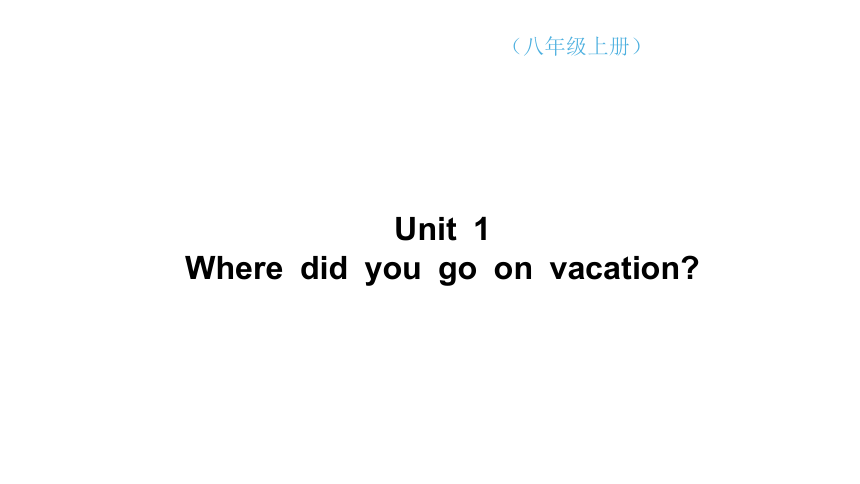 | |
| 格式 | pptx | ||
| 文件大小 | 501.8KB | ||
| 资源类型 | 教案 | ||
| 版本资源 | 人教新目标(Go for it)版 | ||
| 科目 | 英语 | ||
| 更新时间 | 2024-05-21 11:46:07 | ||
图片预览

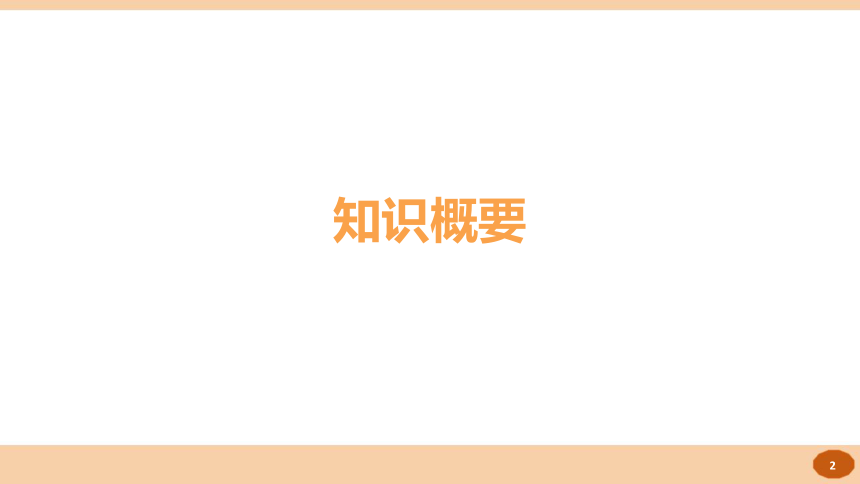
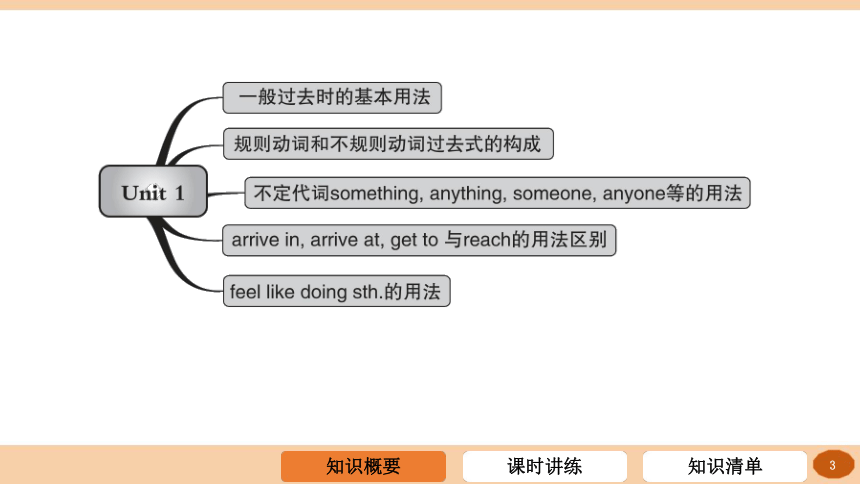

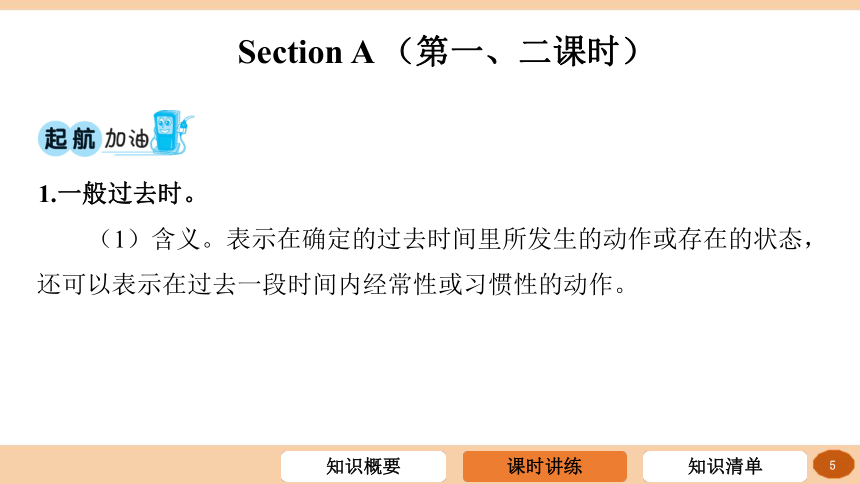
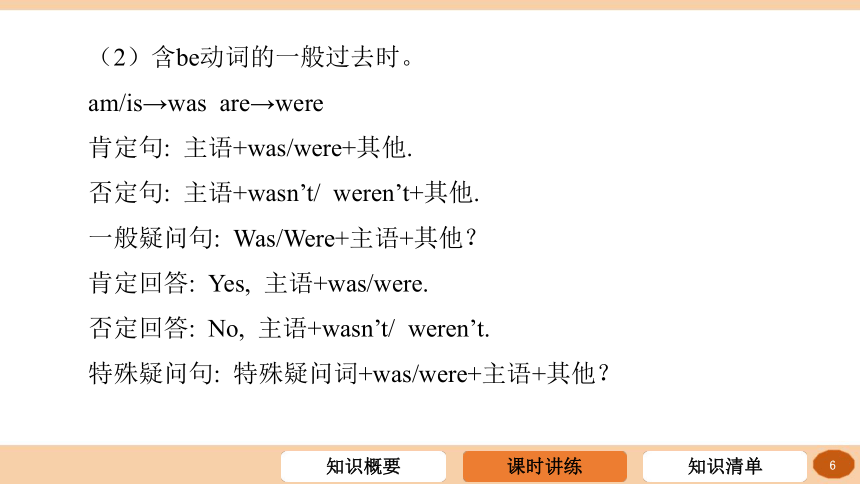
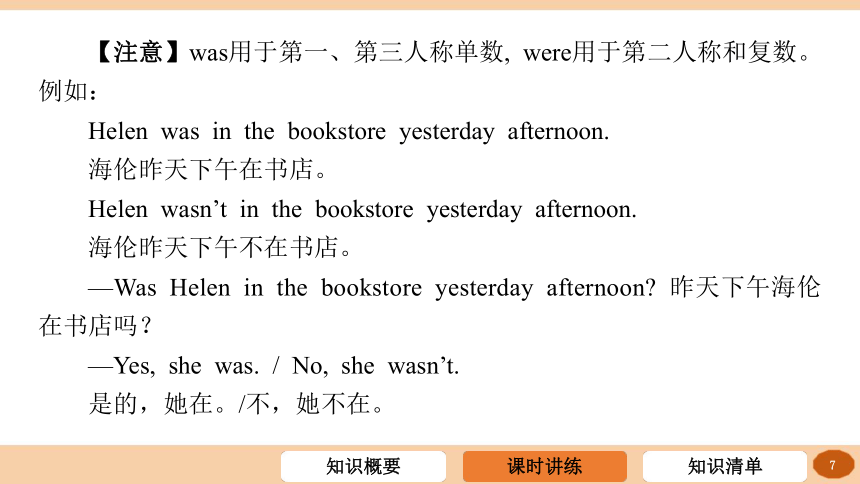
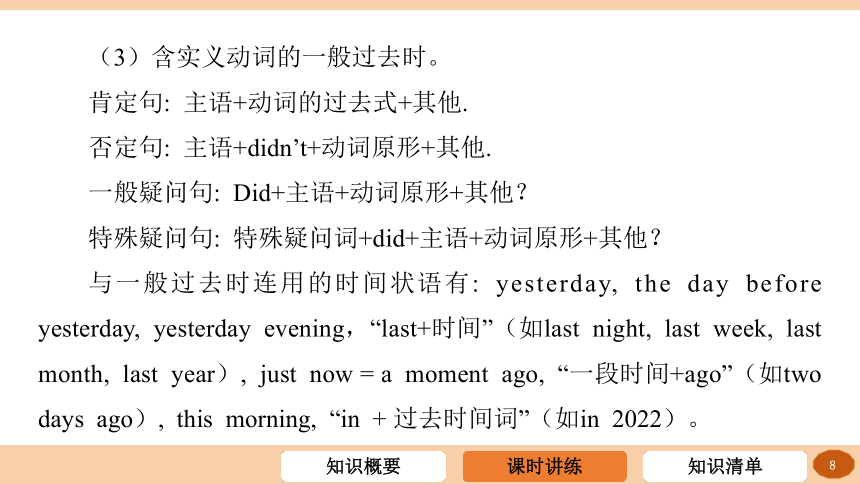
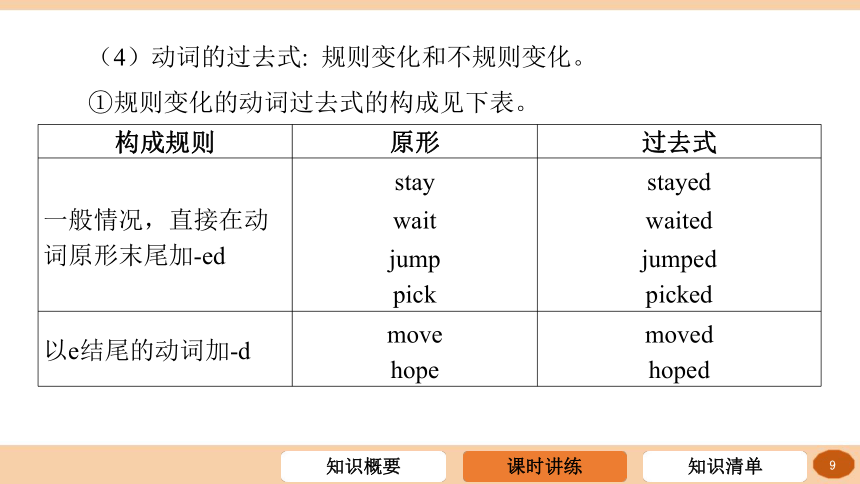
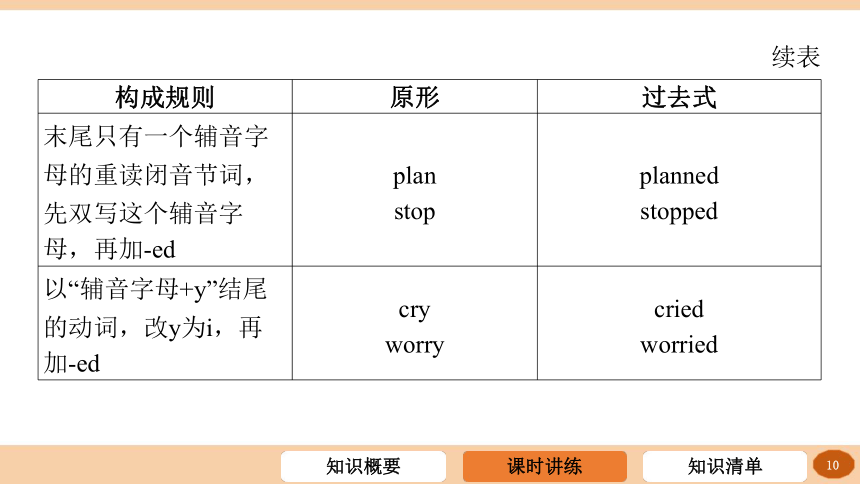
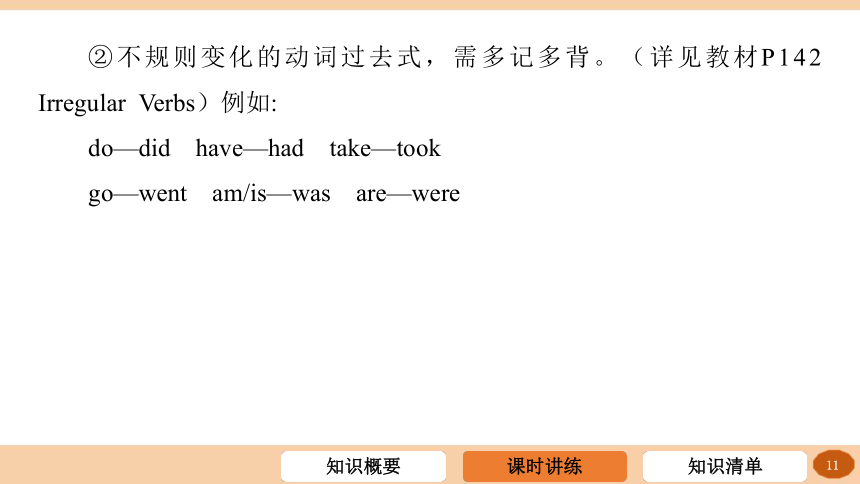
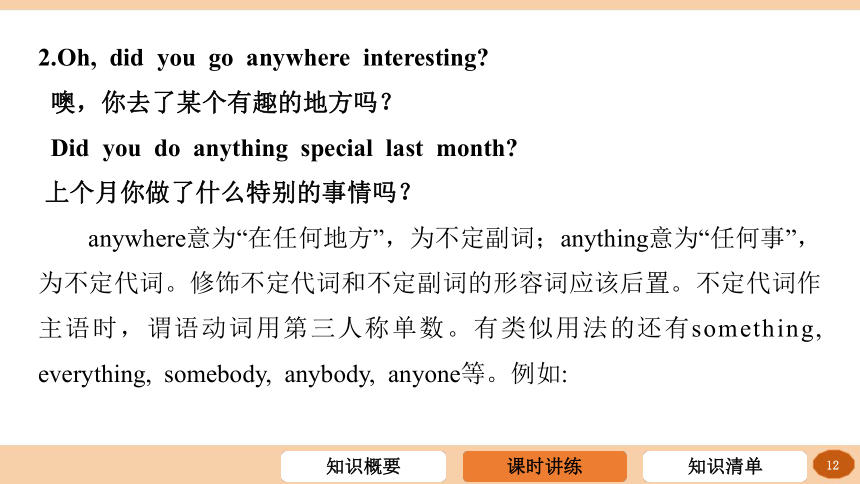
文档简介
(共79张PPT)
Unit 1
Where did you go on vacation
知识概要
课时讲练
1.一般过去时。
(1)含义。表示在确定的过去时间里所发生的动作或存在的状态,还可以表示在过去一段时间内经常性或习惯性的动作。
Section A (第一、二课时)
(2)含be动词的一般过去时。
am/is→was are→were
肯定句: 主语+was/were+其他.
否定句: 主语+wasn’t/ weren’t+其他.
一般疑问句: Was/Were+主语+其他?
肯定回答: Yes, 主语+was/were.
否定回答: No, 主语+wasn’t/ weren’t.
特殊疑问句: 特殊疑问词+was/were+主语+其他?
【注意】was用于第一、第三人称单数, were用于第二人称和复数。例如:
Helen was in the bookstore yesterday afternoon.
海伦昨天下午在书店。
Helen wasn’t in the bookstore yesterday afternoon.
海伦昨天下午不在书店。
—Was Helen in the bookstore yesterday afternoon 昨天下午海伦在书店吗?
—Yes, she was. / No, she wasn’t.
是的,她在。/不,她不在。
(3)含实义动词的一般过去时。
肯定句: 主语+动词的过去式+其他.
否定句: 主语+didn’t+动词原形+其他.
一般疑问句: Did+主语+动词原形+其他?
特殊疑问句: 特殊疑问词+did+主语+动词原形+其他?
与一般过去时连用的时间状语有: yesterday, the day before yesterday, yesterday evening,“last+时间”(如last night, last week, last month, last year), just now = a moment ago, “一段时间+ago”(如two days ago), this morning, “in + 过去时间词”(如in 2022)。
(4)动词的过去式: 规则变化和不规则变化。
①规则变化的动词过去式的构成见下表。
构成规则 原形 过去式
一般情况,直接在动 词原形末尾加-ed stay wait jump pick stayed
waited
jumped
picked
以e结尾的动词加-d move hope moved
hoped
构成规则 原形 过去式
末尾只有一个辅音字 母的重读闭音节词, 先双写这个辅音字 母,再加-ed plan stop planned
stopped
以“辅音字母+y”结尾 的动词,改y为i,再 加-ed cry worry cried
worried
续表
②不规则变化的动词过去式,需多记多背。(详见教材P142 Irregular Verbs)例如:
do—did have—had take—took
go—went am/is—was are—were
2.Oh, did you go anywhere interesting
噢,你去了某个有趣的地方吗?
Did you do anything special last month
上个月你做了什么特别的事情吗?
anywhere意为“在任何地方”,为不定副词;anything意为“任何事”,为不定代词。修饰不定代词和不定副词的形容词应该后置。不定代词作主语时,谓语动词用第三人称单数。有类似用法的还有something, everything, somebody, anybody, anyone等。例如:
We went somewhere exciting yesterday afternoon. 昨天下午我们去了一个令人兴奋的地方。
Anyone likes beautiful things.
任何人都喜欢美丽的东西。
3.We took quite a few photos there.
我们在那儿拍了相当多的照片。
(1)take photos“拍照”,为固定短语。
(2)quite a few意为“相当多”,其后跟可数名词的复数形式。例如:
Nancy loves books and there are quite a few books in her house.
南希爱书,她家里有相当多的书。
【辨析】 few,a few,little,a little
词 语 释 义 用 法
few 很少,几乎没有 修饰可数名词复数,表示否定意义。
a few 有一些,有一点 修饰可数名词复数,表示肯定意义。
little 很少,几乎没有 修饰不可数名词,表示否定意义。
a little 有一些,有一点 修饰不可数名词,表示肯定意义。
例如:
There are a few oranges on the table.
桌子上有一些橙子。
There are few oranges on the table.
桌子上几乎没有橙子。
There is little water in the bottle.
瓶子里几乎没有水。
There is a little water in the bottle.
瓶子里有一些水。
4.What about you 你怎么样?
“What about… ” = “How about… ”, 意为“……怎么样?”。此句型用来询问消息、提供建议或征求意见。about 是介词,后面若接动词,必须用动词-ing形式。about后还可跟名词或代词。例如:
What/How about the story
这个故事怎么样?
What/How about going boating
去划船怎么样?
5.Why didn’t you buy anything special for yourself
你为什么不给自己买点特别的东西?
yourself为反身代词, 意为“你自己, 自己”,其复数形式为yourselves。例如:
You should do your homework by yourself. 你应该自己做你的家庭作业。
I hope you’ll enjoy yourselves at the party. 我希望你们在晚会上玩得愉快。
【拓展】反身代词的单复数见下表。
第一人称 myself我自己 ourselves我们自己
第二人称 yourself你自己 yourselves你们自己
第三人称 himself/herself/ itself他/她/它自己 themselves他/她/它们自己
常用含反身代词的短语:
teach oneself = learn by oneself 自学
enjoy oneself 过得愉快;玩得开心
help oneself to 请随意
by oneself 亲自, 独自
take care of oneself = look after oneself
照顾自己
dress oneself 自己穿衣服
【注意】反身代词应该与主语在人称和数上保持一致。
6.Still no one seemed to be bored.
然而,好像没有人感到无聊。
(1)seem的用法。
①作系动词,意为“好像,似乎”,常用于“seem(+to be)+形容词”结构。例如:
Tom seems (to be) very excited.
汤姆好像很激动。
②seem作行为动词,意为“好像,似乎”,常用于seem to do 或“ It seems that+从句”。这两个结构常可互相转换。例如:
She seems to know the city quite well.
= It seems that she knows the city quite well. 她似乎很了解这座城市。
(2)bored与boring的用法区别。
单词 释 义 用 法
bored 感到厌倦的;烦闷 的 常用来修饰人;-ed形容词常用于
修饰人。
boring 没趣的;令人厌倦 的 常用来修饰物;-ing形容词常用于
修饰物。
例如:
The movie is very boring and I’m bored with it. 这部电影很无趣,我对它感到厌烦。
基础达标
一、单项选择。
1.—Where did you go ________ vacation, Betty
—I went to Sanya ________ my parents.( )
C
A.on;from B.from;with C.on;with
小锦囊
句子为疑问句,不定代词要用anything;修饰不定代词的形容词要后置。
3.—Did you see ________ in the sports hall
—No, I didn’t.( )
A
A.anyone B.someone C.nobody
2.Is there ________ in today’s newspaper ( )
C
A.something interesting B.interesting anything C.anything interesting
5.—Who taught you to play table tennis
—No one. I taught ________.( )
C
A.me B.my C.myself
6.—How ________ your last summer vacation
—It ________ very fantastic.( )
C
A.was; were B.were; was C.was; was
4.—Did you buy ________ for yourself yesterday
—No,I didn’t. But I bought ________ for my grandparents. ( )
A
A.anything;something B.anything;nothing C.something;anything
8.Linda is new at school, so she has________friends here. ( )
A
A.few B.much C.little
9.Dad seems ________ angry. Let’s stop playing the computer
games.( )
C
A.get B.getting C.to get
10.The ________ film made us feel ________.( )
B
A.bored; boring B.boring; bored C.bored; bored
A.visits B.visited C.visiting
7.Frank________ the Palace Museum last Sunday.( )
B
二、根据汉语提示,写出正确的单词完成句子。
1.—Linda, did you go to the cinema with _______(任何人)?
—Yes,I went with my mother.
anyone
2.Becky will stay here in Guilin for a _____(不多) days.
few
3.The poor woman has ________(没有什么) but a small house.
nothing
4.Mary stayed at home ______(大多数)of the time because of the
rain.
most
5.Look at the dark clouds. It _______(似乎)to rain.
seems
三、用括号内所给单词的适当形式填空。
1.Boys and girls,help __________(you) to some fruits.
yourselves
2.Victor wrote a lot of _______(diary) when he was a little boy.
diaries
3.The book is not interesting, and I feel ______(boring).
bored
4.Everything in that shop was expensive, so I didn’t buy _________
(something).
anything
5.They have a __________(wonder) house.
wonderful
能力训练
四、从方框中选择恰当的选项,补全对话。有一项多余。
M: Hello, Bruce speaking.
W: Hi, Bruce. It’s Susan. 1.( )
M: I’m at home. Oh, I had a happy vacation last weekend.
W: 2.( )
F
A. Where did you go
B. How did you go there
C. Did you go anywhere last weekend
D. It was really beautiful!
E. Where did you go in Guilin
F. Where are you now
A
W: Sounds great! I’ll go there next weekend.
M: What about you 5.( )
W: Yes, I went to a farm and helped the farmers pick oranges.
A. Where did you go
B. How did you go there
C. Did you go anywhere last weekend
D. It was really beautiful!
E. Where did you go in Guilin
F. Where are you now
C
M: I went to Guilin with my friends Dick and Gina.
W: 3.( )
M: We went to the Elephant Trunk Hill. 4.( )
E
D
Section B (第三、四课时)
1.本单元主要学习的重点语法是一般过去时,同学们可借助以下顺口溜,帮助记忆:
动词一般过去时,表示过去发生事;
be用was或用were; have, has变had;
谓语动词过去式,过去时间做标志;
一般动词加-ed,若是特殊得硬记。
否定句很简单,主语之后didn’t添;
动词若是was, were, 否定就把not添;
疑问句也不难,did放在主语前;
动词若是was, were, 疑问就把它提前;
谓语之前有did,谓语动词要还原。
2.I wonder what life was like here in the past.
我想知道这里的生活过去是什么样子。
wonder意为“想知道” ( = want to know),其后常接who,what,why等引导的宾语从句。宾语从句应用陈述句语序。例如:
I wonder who he is. 我想知道他是谁。
I wondered why she changed her mind.
我想知道她为什么改变了主意。
3.It was sunny and hot, so we decided to go to the beach near our hotel. 天气晴朗并且炎热, 所以我们决定去我们酒店附近的海滩。
(1)decide to do sth. 意为“决定做某事”。例如:
We decided to walk to the zoo yesterday morning. 昨天上午我们决定步行去动物园。
(2)go to the beach意为“去海滩”。
4.My sister and I tried paragliding.
我和我的姐姐尝试了滑翔伞。
try doing sth. 与try to do sth. 的用法区别。
短 语 释 义 例 句
try doing sth. 试着做某事 You should try eating more fruits. 你应当试着多吃点水果。
try to do sth. 尽力/设法/ 努力做某事 The young man tried to finish the task before sunset. 这个年轻人设法在日落之前完成任务。
【拓展】
①try也可用作不及物动词,意为“尝试;努力”。例如:
I’m not sure if I’ll be able to do it, but I’ll try. 我不知道我能不能做到, 但是我要尝试一下。
②try用作名词,意为“尝试”,常用于短语 have a try, 意为“试一试”。例如:
I would like to have a try. 我想试一试。
③try one’s best to do sth. 意为“尽某人最大努力做某事”。例如:
I will try my best to do the best.
我将尽力做到最好。
5.I felt like I was a bird.
我觉得我好像一只鸟。
(1)“feel like+名词”意为“觉得好像……”。例如:
They made me feel like one of the family. 他们让我觉得自己像是他们家庭中的一员。
(2)feel like doing sth. = want to do sth. = would like to do sth., 意为“想要做某事”。 例如:
Do you feel like watching a movie with me 你想和我去看电影吗?
(3)“feel like+that从句”。例如:
I felt like that I was in a very nice dream. 我感觉好像在做一个美梦。
6.When we got to the top, it was raining really hard. 当我们到达山顶的时候,雨真的下得很大。
get to, arrive 与reach的用法区别。
词语 释义 用 法
get to 到达 其后跟表示地点的副词here, there, home等时,要去掉
介词to。
arrive (in/at) 到达 其后跟表示地点的副词here, there, home等时,不需要
加任何介词。 后面接大的地点,如国家或者大城市
时,用arrive in;后面接小的地点,如镇、家、商店等
时,用arrive at。
reach 到达 reach为及物动词,其后直接跟地点名词。
例如:
When did you get to the bookshop
= When did you arrive at the bookshop
= When did you reach the bookshop
你什么时候到达书店?
Simon arrived in London yesterday afternoon.西蒙昨天下午到达了伦敦。
7.And because of the bad weather, we couldn’t see anything below. 并且因为糟糕的天气,我们看不见下面的任何东西。
because of 与 because 的用法区别。
词语 词性 释义 用 法
because of 介词 短语 因为 其后可跟名词(短语)、代词或
动名词。
because 连词 因为 引导原因状语从句,表示直接、
明确的原因或理由。
例如:
Cindy doesn’t go to school because of illness.
= Cindy doesn’t go to school because she is ill. 辛迪没有去学校,因为她生病了。
8.My father didn’t bring enough money, so we only had one bowl of rice and some fish.
我父亲没有带够钱,所以我们只吃了一碗米饭和一些鱼。
enough意为“足够的;充分的”。enough修饰形容词和副词时要后置,修饰名词时则前置、后置均可。例如:
We have enough time to finish the work. 我们有足够的时间完成这项工作。
The girl is old enough to go to school.
这个女孩已经足够大,可以上学了。
9.My legs were so tired that I wanted to stop. 我的双腿是那么的疲劳,以至于我想停下来。
“so…that…”的意思是“如此……以至于……”,引导结果状语从句。句中的so为副词,用来修饰后面的形容词或副词;that为从句的引导词。
【拓展】
①“so…that…”引导的从句为肯定句时,可以与“enough to…”相互转换。例如:
The book is so easy that the kids can read it.
= The book is easy enough for the kids to read. 这本书很容易,孩子们都能读懂。
②“so…that…”引导的从句为否定句时,可以与“too…to…”相互转换。例如:
The boy is so young that he can’t dress himself.
= The boy is too young to dress himself. 这个男孩太小了,不能自己穿衣服。
③so that引导目的状语从句,意为“以便,为了”。例如:
She studies hard every day so that she can pass the exam.
她每天努力学习以便能通过考试。
基础达标
一、单项选择。
1.—Who broke the cup just now ( )
—I ________.
C
A.do B.doing C.did
2.The weather was rainy, so they decided ________ to the
beach.( )
B
A.not go B.not to go C.not going
3.When we ________ the hotel, it was very late.( )
C
A.got B.reached to C.arrived at
4.—I don’t like ice cream. How about you, Julia
—I ________ it, either.( )
C
A.like B.liked C.dislike
5.Why don’t you try ________more (更多的) friends ( )
A
A.to make B.make C.makes
6.We didn’t go hiking ________ the bad weather.( )
C
A.so B.because C.because of
7.John often eats________fast food, so he is________heavy.( )
A
A.too much; much too B.much too; too many C.too many; much
8.My sister caught a cold and she didn’t feel like ________
anything.( )
C
A.eat B.to eat C.eating
9.The hall isn’t ________ to hold so many people.( )
A
A.big enough B.enough big C.small enough
10.The food is ________ delicious ________ all of us enjoy it.( )
C
A.too; to B.enough; to C.so; that
小锦囊
enough修饰形容词和副词时要后置,修饰名词时则前置或后置均可。
二、根据汉语提示,写出正确的单词完成句子。
1.—Would you like some bread, Dick
—No, thanks. I’m not _______(饥饿的).
hungry
2.We have lots of _________(活动) at school, like playing sports,
drawing and singing.
activities
3.There are lots of ______(鸭子) swimming in the river.
ducks
4.I _______(等待)for half an hour, but she didn’t come.
waited
5.The little girl __________(想知道)who the present was from.
wondered
三、用括号内所给单词的适当形式填空。
1.Those are our new classroom _________(build).
buildings
2.Can you find five ___________(different) between the two pictures
differences
3.Jeff had an_________(enjoy) weekend and he had so much fun.
enjoyable
4.I_______(like) playing soccer,but I love playing tennis.
dislike
5.We must try our best ________(learn) English well.
to learn
能力训练
四、从方框中选择适当的单词,并用其正确形式填空。
for get never swim something
still try umbrella photo oneself
Last summer, my family and I went to England and we spent
three weeks in Cornwall. It took us five hours to 1. . there by car.
We stayed in a hotel near a lake. We did a lot of different things
there:We went for long walks, played games, went shopping and
2. . in the lake.
get
swam
I played very happily at first, but then 3. . terrible
happened (发生). One morning I went to the forest near the hotel
by 4. .. I walked and walked. I watched the birds there and
took some 5. . of them. When I got hungry, I wanted to go
back to the hotel. But I couldn’t find the way back. I 6. .
different ways. However(然而), at last I was 7. . in the same
place.
something
myself
photos
tried
still
for get never swim something
still try umbrella photo oneself
“Oh! What should I do I’m so afraid!” I thought. Later it started
to rain. I didn’t have a(n) 8. . so I was wet and cold. I
decided to stay under a tree and waited 9. . my parents. After a
few hours they found me. It was dark and I was cold, hungry and
scared. I will 10. . go to the forest again.
umbrella
for
never
for get never swim something
still try umbrella photo oneself
Self Check (第五课时)
本单元学习了关于节假日活动的话题,重点学习了用一般过去时描述曾经经历过的旅行。要求同学们掌握用一般过去时描述事情。在写作时,要注意时间、地点、人物、经过、结果等,同时要注意主次分明,详略得当。
可用于这类话题作文的重点句型有:
1.I went to…with…我和……去了……
2.We took quite a few photos there.
我们在那里拍了相当多的照片。
3.It was my first time there,so everything was really interesting. 这是我第一次到那儿,所以一切都真地很有趣。
4.I bought something for my parents.
我给我父母买了一些东西。
5.It was sunny and hot.
天气晴朗并且炎热。
6.It was so wonderful/exciting.
那太精彩/太激动人心了。
7. The food there was delicious and the people there were very friendly.
那里的食物很美味,那里的人很友好。
8.We/I had a good/great/wonderful time there. 我们/我在那里玩得很开心。
9.I felt…我感到……
素养提升
一、情景交际。从方框中选择恰
当的选项,补全对话。
有一项多余。
A: Hello, Helen! Long time no see.
B: Yes. 1. ( )
A: It was pretty good.
B: Where did you go
E
A. How was the food
B. The weather was sunny, so we took many photos there.
C. What places of interest did you visit
D. Did you go anywhere interesting
E. How was your vacation
F. Did you eat anything special there
A: I went to Beijing with my parents.
B: 2. ( ).
A: Tian’anmen Square, the Summer
Palace and the Great Wall.
B: Sounds great! 3. ( ).
A: Yes. I ate Beijing Roast Duck.
It was delicious.
B: How did you like the Great Wall
C
F
A. How was the food
B. The weather was sunny, so we took many photos there.
C. What places of interest did you visit
D. Did you go anywhere interesting
E. How was your vacation
F. Did you eat anything special there
A: Great! 4.( )
B: Please bring your photos to
school tomorrow. Let me see them.
A: No problem! 5.( )
B: Not really. I only helped my uncle
feed chickens on the farm.
B
D
A. How was the food
B. The weather was sunny, so we took many photos there.
C. What places of interest did you visit
D. Did you go anywhere interesting
E. How was your vacation
F. Did you eat anything special there
二、完形填空。
Many people like travelling for their holiday. They go to . .1. ., seaside or forests. Some people like . .2. ., so they like to visit some old interesting places. In many countries, the travel agency(旅行社) can help you . .3. . your holiday. You can tell the travel agency what kind of . .4. . you like, how much . .5. . you want to spend, and the travel agency will give you a lot of information about where to go, how . .6. . there, where to stay, and what kind of activities you can do there. . .7. . the holidays is called “package” holiday. . .8. . is, you just pay the money, and the travel agency will plan . .9. . for you, the ticket . .10. . the plane or train, the hotel, the activities, and so on.
1.( ) A.shops B.hills C.schools
B
2.( ) A.town B.country C.history
C
3.( ) A.hope B.start C.plan
C
4.( ) A.city B.weather C.holiday
C
5.( ) A.time B.day C.money
C
6.( ) A.to get B.get C.got
A
7.( ) A.Most of B.One of C.Both
B
8.( ) A.This B.That C.What
B
9.( ) A.nothing B.anything C.everything
C
10.( ) A.of B.to C.for
C
三、阅读理解。
A
Molly spent her summer vacation in China with her parents. First, they went to Shanghai by plane. “There are so many tall buildings in Shanghai,” Molly said. Then they took the train to Beijing. They stayed in Beijing for seven days and visited some famous places. They also went to zoos and parks. Their third stop is Xi’an. Molly’s parents enjoyed the food there a lot. Molly loved the history museum best. She learned a lot about Chinese history. At last, they went to Chengdu. They saw lovely pandas and enjoyed delicious food there. They really had a great vacation.
根据短文内容,判断下列句子的正(T)误(F)。
1.( ) Molly’s family went to Shanghai by plane.
T
2.( ) Molly saw a lot of parks in Shanghai.
F
3.( ) They stayed for seven days in Beijing.
T
4.( ) Molly liked the history museum best in Xi’an.
T
5.( ) They visited the museum in Chengdu.
F
B
I went on vacation with my family last summer. “Wake up! It’s time to go fishing,” my mom woke me up. After having breakfast we got on a boat. Getting up at 6 a. m. was really early and I was not happy, but later, I had fun.
My uncle caught (抓住) a big fish first. And my mom caught one, too. Then I caught a Black Drum. Next, my dad caught a big Sheepshead. The captain said no one caught a big fish like this one.
We were all happy when we heard this. Later we tried to catch scary fish. My grandpa caught one, but it snapped the line (咬断绳子). My uncle caught one, but it also snapped the line. My dad caught one at last. It didn’t look so scary but was a little funny.
Then our fishing activity was over, and we went back with all the fishes. We were tired but happy!
根据短文内容,选择正确答案。
( ) 6. Who woke up the writer
B
A.His father. B.His mother. C.His uncle.
( ) 7. The underlined word “captain” means “________” in Chinese.
A
A.船长 B.律师 C.司机
( ) 8. Why did they feel happy when they heard the captain’s words
(话)
C
A.Because someone caught a fish the same size as theirs.
B.Because the Black Drum was expensive.
C.Because the fish was the biggest (最大的).
( ) 9.How did they feel when they went back with the fishes
C
A.Scared. B.Lucky. C.Tired but happy.
( ) 10.What does the writer talk about
A
A.His summer vacation. B.His favorite fish. C.His favorite activity.
四、书面表达。
假如你是Becky,你暑假过得很开心。请根据以下要点提示,写一篇60词左右的短文,讲述你是如何度过暑假的。
要点提示:
1.去桂林旅游,游漓江。
2.做自己喜欢的事,如去图书馆看书。
3.每天早上安排两个小时做作业。
4.下午和朋友打排球,进行体育锻炼。
______________________________________________________________
______________________________________________________________________________________________________________________________________________________________________________________________________________________________________________________________________________________________________________________
______________________________________________________________
I enjoyed my summer vacation. I travelled to Guilin with my parents and we had great fun visiting the Lijiang River. During the vacation I often went to the library and read many interesting books. I also spent time in studying. Every morning, I did my homework for two hours. I played volleyball with my friends in the afternoon. I think playing sports can keep us healthy.
One possible version:
知识清单
Unit 1
重点短语
1.__________________________去度假
go on vacation = go on holiday
2._____________待在家里
stay at home
3.__________________去爬山
go to the mountains
4._____________相当多;不少(后接可数名词)
quite a few
5.________出去
go out
6.________________大部分时间
most of the time
7.________________________________________________
玩得高兴;过得愉快
have a good time = enjoy oneself = have fun(doing sth. )
8.__________当然
of course
9.____________写日记
keep a diary
10._____________+大地方
__________+小地方
arrive in
arrive at
11.________________决定去做某事
decide to do sth.
12._______________________想要(做某事)
feel like (doing) sth.
13.___________在过去
in the past
14.____________四处走走
walk around
15._________等待
wait for
16.__________太多
too many
到达某地
17.___________因为
because of
18._________找出;查明
find out
19._______________继续做某事
keep doing sth.
20._______继续
go on
21._____________上上下下
up and down
22._________出来
come up
重点句型
1.____________________________你去了哪里度假
—Where did you go on vacation
________________________我去了纽约。
—I went to New York City.
2.__________________________你和什么人出去了
—Did you go out with anyone
___________________________________________不。没有人在这儿。 每个人都在度假。
—No. No one was here. Everyone was on vacation.
____________________________________
是的。我为我父亲买了一些东西。
—Yes, I bought something for my father.
3.___________________________你买了什么特别的东西吗
—Did you buy anything special
______________________不,我没买什么东西。
—No, I bought nothing.
4.___________________食物怎么样?
—How was the food
_____________________________每一种食物的味道都很好。
—Everything tasted really good.
5._____________________________每个人都过得愉快吗
—Did everyone have a good time
________________________________噢,是的。一切都很棒。
—Oh, yes. Everything was excellent.
6._________________好久不见。
Long time no see.
I arrived in Penang in Malaysia this morning with my family.
7.___________________________……怎么样
What about… = How about…?
8.___________________________________________________
今天早上,我和我的家人到达马来西亚的槟城。
9.___________________________________________________________
We waited over an hour for the train because there were too many people.
10._________________________________________当我们到山顶的时候,雨真地下得很大。
When we got to the top, it was raining really hard.
因为人太多了,所以我们等了一个多小时的火车。
语法要点
1.一般过去时的基本用法。
2.规则和不规则动词过去式的构成。
Unit 1
Where did you go on vacation
知识概要
课时讲练
1.一般过去时。
(1)含义。表示在确定的过去时间里所发生的动作或存在的状态,还可以表示在过去一段时间内经常性或习惯性的动作。
Section A (第一、二课时)
(2)含be动词的一般过去时。
am/is→was are→were
肯定句: 主语+was/were+其他.
否定句: 主语+wasn’t/ weren’t+其他.
一般疑问句: Was/Were+主语+其他?
肯定回答: Yes, 主语+was/were.
否定回答: No, 主语+wasn’t/ weren’t.
特殊疑问句: 特殊疑问词+was/were+主语+其他?
【注意】was用于第一、第三人称单数, were用于第二人称和复数。例如:
Helen was in the bookstore yesterday afternoon.
海伦昨天下午在书店。
Helen wasn’t in the bookstore yesterday afternoon.
海伦昨天下午不在书店。
—Was Helen in the bookstore yesterday afternoon 昨天下午海伦在书店吗?
—Yes, she was. / No, she wasn’t.
是的,她在。/不,她不在。
(3)含实义动词的一般过去时。
肯定句: 主语+动词的过去式+其他.
否定句: 主语+didn’t+动词原形+其他.
一般疑问句: Did+主语+动词原形+其他?
特殊疑问句: 特殊疑问词+did+主语+动词原形+其他?
与一般过去时连用的时间状语有: yesterday, the day before yesterday, yesterday evening,“last+时间”(如last night, last week, last month, last year), just now = a moment ago, “一段时间+ago”(如two days ago), this morning, “in + 过去时间词”(如in 2022)。
(4)动词的过去式: 规则变化和不规则变化。
①规则变化的动词过去式的构成见下表。
构成规则 原形 过去式
一般情况,直接在动 词原形末尾加-ed stay wait jump pick stayed
waited
jumped
picked
以e结尾的动词加-d move hope moved
hoped
构成规则 原形 过去式
末尾只有一个辅音字 母的重读闭音节词, 先双写这个辅音字 母,再加-ed plan stop planned
stopped
以“辅音字母+y”结尾 的动词,改y为i,再 加-ed cry worry cried
worried
续表
②不规则变化的动词过去式,需多记多背。(详见教材P142 Irregular Verbs)例如:
do—did have—had take—took
go—went am/is—was are—were
2.Oh, did you go anywhere interesting
噢,你去了某个有趣的地方吗?
Did you do anything special last month
上个月你做了什么特别的事情吗?
anywhere意为“在任何地方”,为不定副词;anything意为“任何事”,为不定代词。修饰不定代词和不定副词的形容词应该后置。不定代词作主语时,谓语动词用第三人称单数。有类似用法的还有something, everything, somebody, anybody, anyone等。例如:
We went somewhere exciting yesterday afternoon. 昨天下午我们去了一个令人兴奋的地方。
Anyone likes beautiful things.
任何人都喜欢美丽的东西。
3.We took quite a few photos there.
我们在那儿拍了相当多的照片。
(1)take photos“拍照”,为固定短语。
(2)quite a few意为“相当多”,其后跟可数名词的复数形式。例如:
Nancy loves books and there are quite a few books in her house.
南希爱书,她家里有相当多的书。
【辨析】 few,a few,little,a little
词 语 释 义 用 法
few 很少,几乎没有 修饰可数名词复数,表示否定意义。
a few 有一些,有一点 修饰可数名词复数,表示肯定意义。
little 很少,几乎没有 修饰不可数名词,表示否定意义。
a little 有一些,有一点 修饰不可数名词,表示肯定意义。
例如:
There are a few oranges on the table.
桌子上有一些橙子。
There are few oranges on the table.
桌子上几乎没有橙子。
There is little water in the bottle.
瓶子里几乎没有水。
There is a little water in the bottle.
瓶子里有一些水。
4.What about you 你怎么样?
“What about… ” = “How about… ”, 意为“……怎么样?”。此句型用来询问消息、提供建议或征求意见。about 是介词,后面若接动词,必须用动词-ing形式。about后还可跟名词或代词。例如:
What/How about the story
这个故事怎么样?
What/How about going boating
去划船怎么样?
5.Why didn’t you buy anything special for yourself
你为什么不给自己买点特别的东西?
yourself为反身代词, 意为“你自己, 自己”,其复数形式为yourselves。例如:
You should do your homework by yourself. 你应该自己做你的家庭作业。
I hope you’ll enjoy yourselves at the party. 我希望你们在晚会上玩得愉快。
【拓展】反身代词的单复数见下表。
第一人称 myself我自己 ourselves我们自己
第二人称 yourself你自己 yourselves你们自己
第三人称 himself/herself/ itself他/她/它自己 themselves他/她/它们自己
常用含反身代词的短语:
teach oneself = learn by oneself 自学
enjoy oneself 过得愉快;玩得开心
help oneself to 请随意
by oneself 亲自, 独自
take care of oneself = look after oneself
照顾自己
dress oneself 自己穿衣服
【注意】反身代词应该与主语在人称和数上保持一致。
6.Still no one seemed to be bored.
然而,好像没有人感到无聊。
(1)seem的用法。
①作系动词,意为“好像,似乎”,常用于“seem(+to be)+形容词”结构。例如:
Tom seems (to be) very excited.
汤姆好像很激动。
②seem作行为动词,意为“好像,似乎”,常用于seem to do 或“ It seems that+从句”。这两个结构常可互相转换。例如:
She seems to know the city quite well.
= It seems that she knows the city quite well. 她似乎很了解这座城市。
(2)bored与boring的用法区别。
单词 释 义 用 法
bored 感到厌倦的;烦闷 的 常用来修饰人;-ed形容词常用于
修饰人。
boring 没趣的;令人厌倦 的 常用来修饰物;-ing形容词常用于
修饰物。
例如:
The movie is very boring and I’m bored with it. 这部电影很无趣,我对它感到厌烦。
基础达标
一、单项选择。
1.—Where did you go ________ vacation, Betty
—I went to Sanya ________ my parents.( )
C
A.on;from B.from;with C.on;with
小锦囊
句子为疑问句,不定代词要用anything;修饰不定代词的形容词要后置。
3.—Did you see ________ in the sports hall
—No, I didn’t.( )
A
A.anyone B.someone C.nobody
2.Is there ________ in today’s newspaper ( )
C
A.something interesting B.interesting anything C.anything interesting
5.—Who taught you to play table tennis
—No one. I taught ________.( )
C
A.me B.my C.myself
6.—How ________ your last summer vacation
—It ________ very fantastic.( )
C
A.was; were B.were; was C.was; was
4.—Did you buy ________ for yourself yesterday
—No,I didn’t. But I bought ________ for my grandparents. ( )
A
A.anything;something B.anything;nothing C.something;anything
8.Linda is new at school, so she has________friends here. ( )
A
A.few B.much C.little
9.Dad seems ________ angry. Let’s stop playing the computer
games.( )
C
A.get B.getting C.to get
10.The ________ film made us feel ________.( )
B
A.bored; boring B.boring; bored C.bored; bored
A.visits B.visited C.visiting
7.Frank________ the Palace Museum last Sunday.( )
B
二、根据汉语提示,写出正确的单词完成句子。
1.—Linda, did you go to the cinema with _______(任何人)?
—Yes,I went with my mother.
anyone
2.Becky will stay here in Guilin for a _____(不多) days.
few
3.The poor woman has ________(没有什么) but a small house.
nothing
4.Mary stayed at home ______(大多数)of the time because of the
rain.
most
5.Look at the dark clouds. It _______(似乎)to rain.
seems
三、用括号内所给单词的适当形式填空。
1.Boys and girls,help __________(you) to some fruits.
yourselves
2.Victor wrote a lot of _______(diary) when he was a little boy.
diaries
3.The book is not interesting, and I feel ______(boring).
bored
4.Everything in that shop was expensive, so I didn’t buy _________
(something).
anything
5.They have a __________(wonder) house.
wonderful
能力训练
四、从方框中选择恰当的选项,补全对话。有一项多余。
M: Hello, Bruce speaking.
W: Hi, Bruce. It’s Susan. 1.( )
M: I’m at home. Oh, I had a happy vacation last weekend.
W: 2.( )
F
A. Where did you go
B. How did you go there
C. Did you go anywhere last weekend
D. It was really beautiful!
E. Where did you go in Guilin
F. Where are you now
A
W: Sounds great! I’ll go there next weekend.
M: What about you 5.( )
W: Yes, I went to a farm and helped the farmers pick oranges.
A. Where did you go
B. How did you go there
C. Did you go anywhere last weekend
D. It was really beautiful!
E. Where did you go in Guilin
F. Where are you now
C
M: I went to Guilin with my friends Dick and Gina.
W: 3.( )
M: We went to the Elephant Trunk Hill. 4.( )
E
D
Section B (第三、四课时)
1.本单元主要学习的重点语法是一般过去时,同学们可借助以下顺口溜,帮助记忆:
动词一般过去时,表示过去发生事;
be用was或用were; have, has变had;
谓语动词过去式,过去时间做标志;
一般动词加-ed,若是特殊得硬记。
否定句很简单,主语之后didn’t添;
动词若是was, were, 否定就把not添;
疑问句也不难,did放在主语前;
动词若是was, were, 疑问就把它提前;
谓语之前有did,谓语动词要还原。
2.I wonder what life was like here in the past.
我想知道这里的生活过去是什么样子。
wonder意为“想知道” ( = want to know),其后常接who,what,why等引导的宾语从句。宾语从句应用陈述句语序。例如:
I wonder who he is. 我想知道他是谁。
I wondered why she changed her mind.
我想知道她为什么改变了主意。
3.It was sunny and hot, so we decided to go to the beach near our hotel. 天气晴朗并且炎热, 所以我们决定去我们酒店附近的海滩。
(1)decide to do sth. 意为“决定做某事”。例如:
We decided to walk to the zoo yesterday morning. 昨天上午我们决定步行去动物园。
(2)go to the beach意为“去海滩”。
4.My sister and I tried paragliding.
我和我的姐姐尝试了滑翔伞。
try doing sth. 与try to do sth. 的用法区别。
短 语 释 义 例 句
try doing sth. 试着做某事 You should try eating more fruits. 你应当试着多吃点水果。
try to do sth. 尽力/设法/ 努力做某事 The young man tried to finish the task before sunset. 这个年轻人设法在日落之前完成任务。
【拓展】
①try也可用作不及物动词,意为“尝试;努力”。例如:
I’m not sure if I’ll be able to do it, but I’ll try. 我不知道我能不能做到, 但是我要尝试一下。
②try用作名词,意为“尝试”,常用于短语 have a try, 意为“试一试”。例如:
I would like to have a try. 我想试一试。
③try one’s best to do sth. 意为“尽某人最大努力做某事”。例如:
I will try my best to do the best.
我将尽力做到最好。
5.I felt like I was a bird.
我觉得我好像一只鸟。
(1)“feel like+名词”意为“觉得好像……”。例如:
They made me feel like one of the family. 他们让我觉得自己像是他们家庭中的一员。
(2)feel like doing sth. = want to do sth. = would like to do sth., 意为“想要做某事”。 例如:
Do you feel like watching a movie with me 你想和我去看电影吗?
(3)“feel like+that从句”。例如:
I felt like that I was in a very nice dream. 我感觉好像在做一个美梦。
6.When we got to the top, it was raining really hard. 当我们到达山顶的时候,雨真的下得很大。
get to, arrive 与reach的用法区别。
词语 释义 用 法
get to 到达 其后跟表示地点的副词here, there, home等时,要去掉
介词to。
arrive (in/at) 到达 其后跟表示地点的副词here, there, home等时,不需要
加任何介词。 后面接大的地点,如国家或者大城市
时,用arrive in;后面接小的地点,如镇、家、商店等
时,用arrive at。
reach 到达 reach为及物动词,其后直接跟地点名词。
例如:
When did you get to the bookshop
= When did you arrive at the bookshop
= When did you reach the bookshop
你什么时候到达书店?
Simon arrived in London yesterday afternoon.西蒙昨天下午到达了伦敦。
7.And because of the bad weather, we couldn’t see anything below. 并且因为糟糕的天气,我们看不见下面的任何东西。
because of 与 because 的用法区别。
词语 词性 释义 用 法
because of 介词 短语 因为 其后可跟名词(短语)、代词或
动名词。
because 连词 因为 引导原因状语从句,表示直接、
明确的原因或理由。
例如:
Cindy doesn’t go to school because of illness.
= Cindy doesn’t go to school because she is ill. 辛迪没有去学校,因为她生病了。
8.My father didn’t bring enough money, so we only had one bowl of rice and some fish.
我父亲没有带够钱,所以我们只吃了一碗米饭和一些鱼。
enough意为“足够的;充分的”。enough修饰形容词和副词时要后置,修饰名词时则前置、后置均可。例如:
We have enough time to finish the work. 我们有足够的时间完成这项工作。
The girl is old enough to go to school.
这个女孩已经足够大,可以上学了。
9.My legs were so tired that I wanted to stop. 我的双腿是那么的疲劳,以至于我想停下来。
“so…that…”的意思是“如此……以至于……”,引导结果状语从句。句中的so为副词,用来修饰后面的形容词或副词;that为从句的引导词。
【拓展】
①“so…that…”引导的从句为肯定句时,可以与“enough to…”相互转换。例如:
The book is so easy that the kids can read it.
= The book is easy enough for the kids to read. 这本书很容易,孩子们都能读懂。
②“so…that…”引导的从句为否定句时,可以与“too…to…”相互转换。例如:
The boy is so young that he can’t dress himself.
= The boy is too young to dress himself. 这个男孩太小了,不能自己穿衣服。
③so that引导目的状语从句,意为“以便,为了”。例如:
She studies hard every day so that she can pass the exam.
她每天努力学习以便能通过考试。
基础达标
一、单项选择。
1.—Who broke the cup just now ( )
—I ________.
C
A.do B.doing C.did
2.The weather was rainy, so they decided ________ to the
beach.( )
B
A.not go B.not to go C.not going
3.When we ________ the hotel, it was very late.( )
C
A.got B.reached to C.arrived at
4.—I don’t like ice cream. How about you, Julia
—I ________ it, either.( )
C
A.like B.liked C.dislike
5.Why don’t you try ________more (更多的) friends ( )
A
A.to make B.make C.makes
6.We didn’t go hiking ________ the bad weather.( )
C
A.so B.because C.because of
7.John often eats________fast food, so he is________heavy.( )
A
A.too much; much too B.much too; too many C.too many; much
8.My sister caught a cold and she didn’t feel like ________
anything.( )
C
A.eat B.to eat C.eating
9.The hall isn’t ________ to hold so many people.( )
A
A.big enough B.enough big C.small enough
10.The food is ________ delicious ________ all of us enjoy it.( )
C
A.too; to B.enough; to C.so; that
小锦囊
enough修饰形容词和副词时要后置,修饰名词时则前置或后置均可。
二、根据汉语提示,写出正确的单词完成句子。
1.—Would you like some bread, Dick
—No, thanks. I’m not _______(饥饿的).
hungry
2.We have lots of _________(活动) at school, like playing sports,
drawing and singing.
activities
3.There are lots of ______(鸭子) swimming in the river.
ducks
4.I _______(等待)for half an hour, but she didn’t come.
waited
5.The little girl __________(想知道)who the present was from.
wondered
三、用括号内所给单词的适当形式填空。
1.Those are our new classroom _________(build).
buildings
2.Can you find five ___________(different) between the two pictures
differences
3.Jeff had an_________(enjoy) weekend and he had so much fun.
enjoyable
4.I_______(like) playing soccer,but I love playing tennis.
dislike
5.We must try our best ________(learn) English well.
to learn
能力训练
四、从方框中选择适当的单词,并用其正确形式填空。
for get never swim something
still try umbrella photo oneself
Last summer, my family and I went to England and we spent
three weeks in Cornwall. It took us five hours to 1. . there by car.
We stayed in a hotel near a lake. We did a lot of different things
there:We went for long walks, played games, went shopping and
2. . in the lake.
get
swam
I played very happily at first, but then 3. . terrible
happened (发生). One morning I went to the forest near the hotel
by 4. .. I walked and walked. I watched the birds there and
took some 5. . of them. When I got hungry, I wanted to go
back to the hotel. But I couldn’t find the way back. I 6. .
different ways. However(然而), at last I was 7. . in the same
place.
something
myself
photos
tried
still
for get never swim something
still try umbrella photo oneself
“Oh! What should I do I’m so afraid!” I thought. Later it started
to rain. I didn’t have a(n) 8. . so I was wet and cold. I
decided to stay under a tree and waited 9. . my parents. After a
few hours they found me. It was dark and I was cold, hungry and
scared. I will 10. . go to the forest again.
umbrella
for
never
for get never swim something
still try umbrella photo oneself
Self Check (第五课时)
本单元学习了关于节假日活动的话题,重点学习了用一般过去时描述曾经经历过的旅行。要求同学们掌握用一般过去时描述事情。在写作时,要注意时间、地点、人物、经过、结果等,同时要注意主次分明,详略得当。
可用于这类话题作文的重点句型有:
1.I went to…with…我和……去了……
2.We took quite a few photos there.
我们在那里拍了相当多的照片。
3.It was my first time there,so everything was really interesting. 这是我第一次到那儿,所以一切都真地很有趣。
4.I bought something for my parents.
我给我父母买了一些东西。
5.It was sunny and hot.
天气晴朗并且炎热。
6.It was so wonderful/exciting.
那太精彩/太激动人心了。
7. The food there was delicious and the people there were very friendly.
那里的食物很美味,那里的人很友好。
8.We/I had a good/great/wonderful time there. 我们/我在那里玩得很开心。
9.I felt…我感到……
素养提升
一、情景交际。从方框中选择恰
当的选项,补全对话。
有一项多余。
A: Hello, Helen! Long time no see.
B: Yes. 1. ( )
A: It was pretty good.
B: Where did you go
E
A. How was the food
B. The weather was sunny, so we took many photos there.
C. What places of interest did you visit
D. Did you go anywhere interesting
E. How was your vacation
F. Did you eat anything special there
A: I went to Beijing with my parents.
B: 2. ( ).
A: Tian’anmen Square, the Summer
Palace and the Great Wall.
B: Sounds great! 3. ( ).
A: Yes. I ate Beijing Roast Duck.
It was delicious.
B: How did you like the Great Wall
C
F
A. How was the food
B. The weather was sunny, so we took many photos there.
C. What places of interest did you visit
D. Did you go anywhere interesting
E. How was your vacation
F. Did you eat anything special there
A: Great! 4.( )
B: Please bring your photos to
school tomorrow. Let me see them.
A: No problem! 5.( )
B: Not really. I only helped my uncle
feed chickens on the farm.
B
D
A. How was the food
B. The weather was sunny, so we took many photos there.
C. What places of interest did you visit
D. Did you go anywhere interesting
E. How was your vacation
F. Did you eat anything special there
二、完形填空。
Many people like travelling for their holiday. They go to . .1. ., seaside or forests. Some people like . .2. ., so they like to visit some old interesting places. In many countries, the travel agency(旅行社) can help you . .3. . your holiday. You can tell the travel agency what kind of . .4. . you like, how much . .5. . you want to spend, and the travel agency will give you a lot of information about where to go, how . .6. . there, where to stay, and what kind of activities you can do there. . .7. . the holidays is called “package” holiday. . .8. . is, you just pay the money, and the travel agency will plan . .9. . for you, the ticket . .10. . the plane or train, the hotel, the activities, and so on.
1.( ) A.shops B.hills C.schools
B
2.( ) A.town B.country C.history
C
3.( ) A.hope B.start C.plan
C
4.( ) A.city B.weather C.holiday
C
5.( ) A.time B.day C.money
C
6.( ) A.to get B.get C.got
A
7.( ) A.Most of B.One of C.Both
B
8.( ) A.This B.That C.What
B
9.( ) A.nothing B.anything C.everything
C
10.( ) A.of B.to C.for
C
三、阅读理解。
A
Molly spent her summer vacation in China with her parents. First, they went to Shanghai by plane. “There are so many tall buildings in Shanghai,” Molly said. Then they took the train to Beijing. They stayed in Beijing for seven days and visited some famous places. They also went to zoos and parks. Their third stop is Xi’an. Molly’s parents enjoyed the food there a lot. Molly loved the history museum best. She learned a lot about Chinese history. At last, they went to Chengdu. They saw lovely pandas and enjoyed delicious food there. They really had a great vacation.
根据短文内容,判断下列句子的正(T)误(F)。
1.( ) Molly’s family went to Shanghai by plane.
T
2.( ) Molly saw a lot of parks in Shanghai.
F
3.( ) They stayed for seven days in Beijing.
T
4.( ) Molly liked the history museum best in Xi’an.
T
5.( ) They visited the museum in Chengdu.
F
B
I went on vacation with my family last summer. “Wake up! It’s time to go fishing,” my mom woke me up. After having breakfast we got on a boat. Getting up at 6 a. m. was really early and I was not happy, but later, I had fun.
My uncle caught (抓住) a big fish first. And my mom caught one, too. Then I caught a Black Drum. Next, my dad caught a big Sheepshead. The captain said no one caught a big fish like this one.
We were all happy when we heard this. Later we tried to catch scary fish. My grandpa caught one, but it snapped the line (咬断绳子). My uncle caught one, but it also snapped the line. My dad caught one at last. It didn’t look so scary but was a little funny.
Then our fishing activity was over, and we went back with all the fishes. We were tired but happy!
根据短文内容,选择正确答案。
( ) 6. Who woke up the writer
B
A.His father. B.His mother. C.His uncle.
( ) 7. The underlined word “captain” means “________” in Chinese.
A
A.船长 B.律师 C.司机
( ) 8. Why did they feel happy when they heard the captain’s words
(话)
C
A.Because someone caught a fish the same size as theirs.
B.Because the Black Drum was expensive.
C.Because the fish was the biggest (最大的).
( ) 9.How did they feel when they went back with the fishes
C
A.Scared. B.Lucky. C.Tired but happy.
( ) 10.What does the writer talk about
A
A.His summer vacation. B.His favorite fish. C.His favorite activity.
四、书面表达。
假如你是Becky,你暑假过得很开心。请根据以下要点提示,写一篇60词左右的短文,讲述你是如何度过暑假的。
要点提示:
1.去桂林旅游,游漓江。
2.做自己喜欢的事,如去图书馆看书。
3.每天早上安排两个小时做作业。
4.下午和朋友打排球,进行体育锻炼。
______________________________________________________________
______________________________________________________________________________________________________________________________________________________________________________________________________________________________________________________________________________________________________________________
______________________________________________________________
I enjoyed my summer vacation. I travelled to Guilin with my parents and we had great fun visiting the Lijiang River. During the vacation I often went to the library and read many interesting books. I also spent time in studying. Every morning, I did my homework for two hours. I played volleyball with my friends in the afternoon. I think playing sports can keep us healthy.
One possible version:
知识清单
Unit 1
重点短语
1.__________________________去度假
go on vacation = go on holiday
2._____________待在家里
stay at home
3.__________________去爬山
go to the mountains
4._____________相当多;不少(后接可数名词)
quite a few
5.________出去
go out
6.________________大部分时间
most of the time
7.________________________________________________
玩得高兴;过得愉快
have a good time = enjoy oneself = have fun(doing sth. )
8.__________当然
of course
9.____________写日记
keep a diary
10._____________+大地方
__________+小地方
arrive in
arrive at
11.________________决定去做某事
decide to do sth.
12._______________________想要(做某事)
feel like (doing) sth.
13.___________在过去
in the past
14.____________四处走走
walk around
15._________等待
wait for
16.__________太多
too many
到达某地
17.___________因为
because of
18._________找出;查明
find out
19._______________继续做某事
keep doing sth.
20._______继续
go on
21._____________上上下下
up and down
22._________出来
come up
重点句型
1.____________________________你去了哪里度假
—Where did you go on vacation
________________________我去了纽约。
—I went to New York City.
2.__________________________你和什么人出去了
—Did you go out with anyone
___________________________________________不。没有人在这儿。 每个人都在度假。
—No. No one was here. Everyone was on vacation.
____________________________________
是的。我为我父亲买了一些东西。
—Yes, I bought something for my father.
3.___________________________你买了什么特别的东西吗
—Did you buy anything special
______________________不,我没买什么东西。
—No, I bought nothing.
4.___________________食物怎么样?
—How was the food
_____________________________每一种食物的味道都很好。
—Everything tasted really good.
5._____________________________每个人都过得愉快吗
—Did everyone have a good time
________________________________噢,是的。一切都很棒。
—Oh, yes. Everything was excellent.
6._________________好久不见。
Long time no see.
I arrived in Penang in Malaysia this morning with my family.
7.___________________________……怎么样
What about… = How about…?
8.___________________________________________________
今天早上,我和我的家人到达马来西亚的槟城。
9.___________________________________________________________
We waited over an hour for the train because there were too many people.
10._________________________________________当我们到山顶的时候,雨真地下得很大。
When we got to the top, it was raining really hard.
因为人太多了,所以我们等了一个多小时的火车。
语法要点
1.一般过去时的基本用法。
2.规则和不规则动词过去式的构成。
同课章节目录
- Unit 1 Where did you go on vacation?
- Section A
- Section B
- Unit 2 How often do you exercise?
- Section A
- Section B
- Unit 3 I'm more outgoing than my sister.
- Section A
- Section B
- Unit 4 What's the best movie theater?
- Section A
- Section B
- Unit 5 Do you want to watch a game show?
- Section A
- Section B
- Unit 6 I'm going to study computer science.
- Section A
- Section B
- Unit 7 Will people have robots?
- Section A
- Section B
- Unit 8 How do you make a banana milk shake?
- Section A
- Section B
- Unit 9 Can you come to my party?
- Section A
- Section B
- Unit 10 If you go to the party, you'll have a grea
- Section A
- Section B
